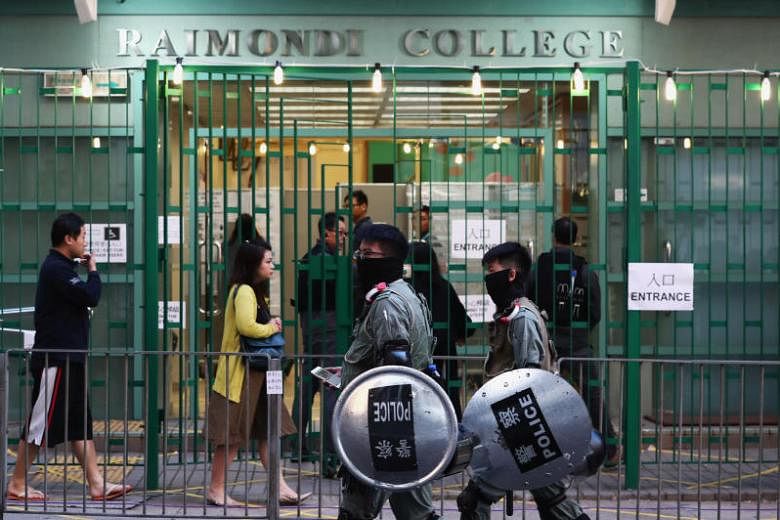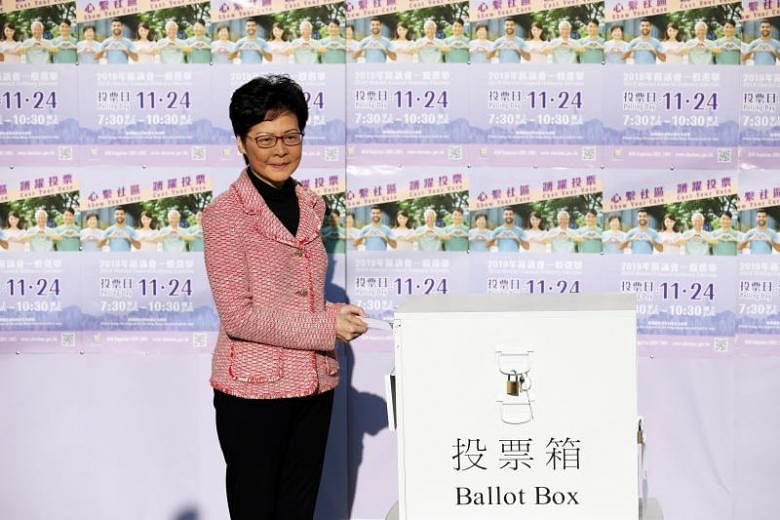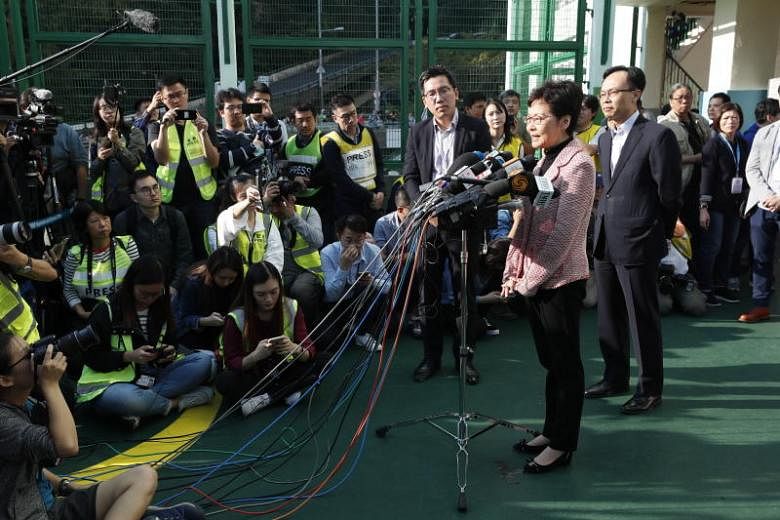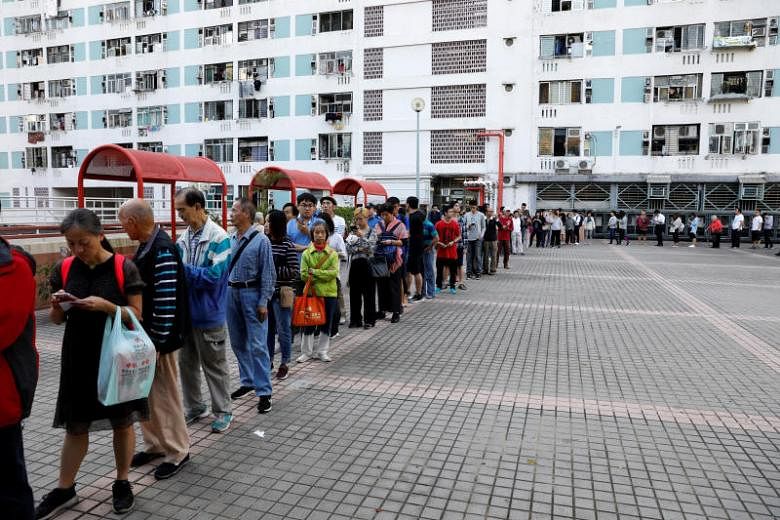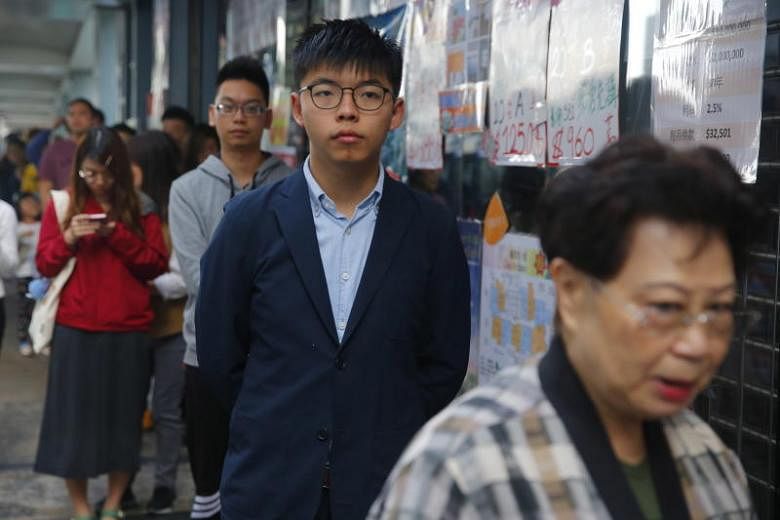HONG KONG (BLOOMBERG, WASHINGTON POST, AGENCE FRANCE-PRESSE, DPA) - The people of Hong Kong took a breather from months of bitter street clashes to exercise their democratic rights on Sunday (Nov 24) in local elections seen as a referendum on the territory's pro-Beijing leaders and the pro-democracy movement.
By the time polls opened at 7.30am local time, snaking lines had formed around schools and government buildings serving as polling stations - a new experience for many in Hong Kong, where local elections usually happen with little fanfare.
The South China Morning Post reported that by 8.30am, nearly 158,000 people, or 3.82 per cent of the registered total, had cast their vote. The turnout rate in the first hour of voting was three times higher than for the same period in 2015, when only 39,900 people, or 1.28 per cent of registered people, had voted.
Many candidates are running on an explicit platform of supporting the months-long democracy movement here, leaving their jobs to compete with pro-establishment political heavyweights.
"I want to make a change," said Oscar, a 30-year old voter in the North Point district, a pro-Beijing stronghold. "All we want is democracy."
Oscar, who gave only his first name, citing electoral rules and a charged political environment, said he plans to support young candidates running in his district even though they lacked experience.
"The election is the last chance to express our opinion. Most of the protests were banned by the government," a 26-year-old bank clerk said after casting his vote.
"In the last election, there were only pro-Beijing candidates in our district. This time there is also a democratic candidate. Something has changed."
Jason, a 30-year-old freelancer, waited more than one our in front of the polling station at Hong Kong's Queens College.
"I would have waited even longer. We want democracy and an end to police violence."
In North Point, five new politicians are running, including a fresh university graduate who was moved to participate after violence against pro-democracy protesters in her neighbourhood.
District council elections are normally largely fought on local issues, with pro-Beijing parties usually dominating, partly thanks to their links to the business community and the political establishment.
This time, though, the pro-Beijing parties fear Sunday's elections could show a significant decline in their support, reflecting widespread concerns over China's erosion of freedoms in the semi-autonomous territory.
For these candidates, their hope is that Hong Kong has a "silent majority" of residents who are increasingly uncomfortable with disruption and sporadic violence caused by street protests and who will vote to endorse the establishment.
A 62-year-old voter who gave his last name as Tsang also turned up to the North Point district early, hoping his vote could help "restore a peaceful society".
Pro-democracy parties see the vote as a chance for people to express support for their cause and send a strong message to the Hong Kong government and their political masters in Beijing.
It is the only fully democratic election in Hong Kong, as the city's leader is not directly elected and only half of Hong Kong's Legislative Council, the lawmaking body, is directly elected.

Ms Katherine Ng, 25, a first-time voter, said pro-democracy supporters like her are trying to bring their fight to the political arena. Ms Ng voted in Causeway Bay, a middle-class neighbourhood known for high-end shopping malls and dominated by establishment political figures.
"We need to vote these pro-establishment councillors out," she said.
There has been a surge of interest in the elections among the broader public, and a real effort by pro-democracy groups to get people to register, with sign-up booths along the routes of marches during the early, peaceful days of the protests.
More than 390,000 new electors signed up this year, bringing the total registered voters to a record 4.1 million.
In the first hour of voting on Sunday, the turnout was triple what it was in 2015, according to election authorities.
Hundreds of new pro-democracy candidates have also been inspired to participate in politics amid the unrest that has engulfed city streets.
In all, 1,090 candidates are contesting 452 seats, the first time that all the seats in the election have been contested.
The weeks leading up to the vote saw the biggest escalation in violence since the protests began more than five months ago, with hundreds of demonstrators arrested after a police siege of a university campus that had become a fortified base for the movement.
Sunday's elections were marked by heightened levels of security, including masked riot police officers at polling stations across the city.
But the day before the vote was one of the quietest Hong Kong had experienced in months, with protesters keen to avoid giving the authorities any excuse to cancel the elections.
On online forums and message groups, protesters advised one another not to wear black - the unofficial uniform of the pro-democracy movement - on election day to avoid being detained and denied the right to vote.
The local election has also been marred by political violence against councillors from both sides - though pro-democracy candidates have overwhelmingly been the targets - and the arrest of several pro-democracy lawmakers.
Prominent activist Joshua Wong was barred from running for office, which he alleged was evidence of election interference from Beijing.
In 2015, pro-Beijing parties won just over 54 per cent of the vote and 298 seats, taking control of all 18 district councils.
They tend to be better resourced and better organised than pro-democracy groups, with solid links between the communities and the establishment that have historically allowed them to get things done for constituents.
Pro-democracy groups won 40 per cent of the vote in 2015 and 126 seats, with independents taking the remainder.
They will be hoping for a repeat of the 2003 district council elections, when they saw a surge in support after mass demonstrations over the government's plans to introduce a controversial national security law.
Chinese state media argue that a "silent majority" in Hong Kong oppose the protests because of the violence that has been unleashed on the city.
But opinion polls show people overwhelmingly blame the government for the violence, even if they feel the protesters shoulder some responsibility.
District councillors' responsibilities are largely local, but they are given 117 seats on the 1,200-member election committee - dominated by pro-Beijing groups and business interests - that selects Hong Kong's chief executive.
Polling stations will remain open until 10.30pm, with results expected to start coming in late on Sunday and into Monday.
What's at stake in the polls
The surge in violence across Hong Kong could derail Sunday's District Council Ordinary Election. Here are some key facts.
WHAT DOES A DISTRICT COUNCIL DO?
The functions of a district council include advising the government on matters affecting residents' well-being, the adequacy and priorities of government programmes for the district, and the use of public funds allocated to the district for public works and community activities.
There are 479 district council members, comprising 452 elected members and 27 ex-officio members who are rural committee chairmen in the New Territories. In all, 1,090 candidates are jockeying for 452 positions in all 18 district councils, with more than 4.13 million eligible voters.
District councillors wield little real power, with no authority to pass laws or decide on government policies. But their seats make up a sizeable portion of the committee that selects the Hong Kong chief executive, with the other half picked by the Chinese government.
WHERE DO THE PARTIES STAND?
Support for traditional pan-democratic parties such as the Democratic Party and the Civic Party has remained largely unchanged this past year, according to a Pori survey on support for Hong Kong's top 10 political groups, while parties that voters perceive to be more radical (Demosisto and People Power) are seeing their support rising. Ms Tiffany Yuen, former vice-chairman of Demosisto, a political party co-founded by democracy activist Joshua Wong, is competing for a seat. Mr Wong was, last month, barred from running.
